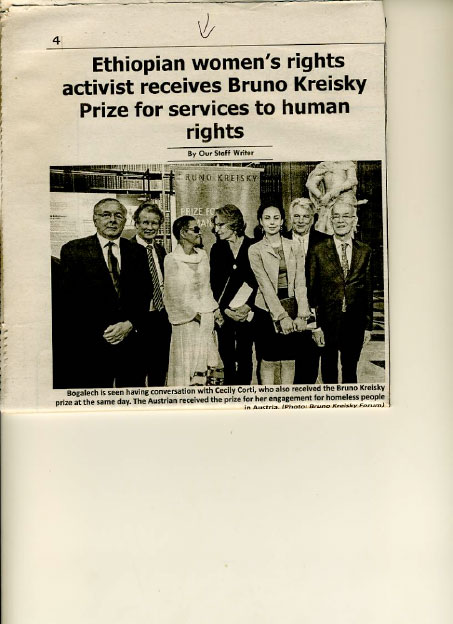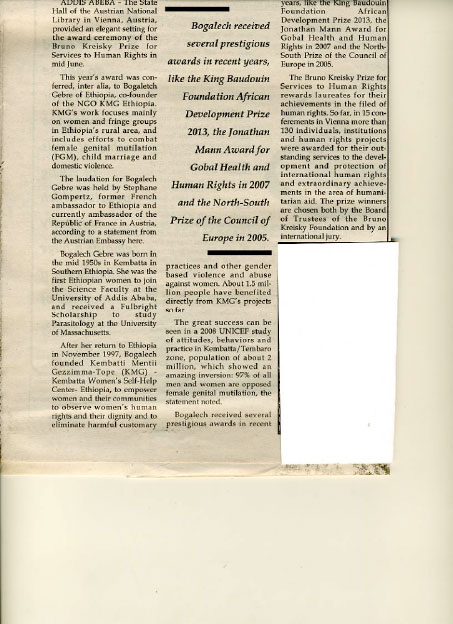18th presentation of the Bruno Kreisky Prize for services to human rights
Cash desk of the Oesterreichische nationalbank, Otto-Wagner-Platz 3, 1090 Vienna May 20, 2019, 6 p.m
Greeting:
governor
university Prof. Dr. Ewald Nowotny
Chairman of the board of trustees of the Bruno Kreisky Foundation for services to human rights
The 2019 award winners at a glance:
International nomination: Amal Fathy
With Laudation by Dr. Gudrun Harrer (journalist/Middle East expert)
National nomination: Shalom Alaikum - Jewish Aid for Refugees
With Laudation by Dr. Doron Rabinovici (writer/historian)
National nomination: Know your rights project
With Laudation by Mag.a Corinna Milborn (author/journalist)
Thanks and final words:
university Prof. DDr. Oliver Rathkolb
Member of the Board, Bruno Kreisky Foundation for Services to Human Rights
subsequent reception
On May 20, 2019, starting at 6 p.m., the Bruno Kreisky Foundation will award Austria’s oldest renowned human rights prize, named after Federal Chancellor Bruno Kreisky, in the cash desk of the Oesterreichische Nationalbank (Otto-Wagner-Platz 3, 1090 Vienna).
The international jury of the Bruno Kreisky Prize for Services to Human Rights unanimously awarded the international Bruno Kreisky Human Rights Prize to the Egyptian activist Amal Fathy for her outstanding contributions to safeguarding human rights.
Amal Fathy is a member of the Egyptian Commission for Rights and Freedoms (ECRF), a civil society organization that documents torture, enforced disappearances and extrajudicial killings in Egypt. In May 2018, she posted a video on her Facebook page denouncing the sexual harassment she was subjected to that day and the government's passive handling of such incidents, as well as the deteriorating living conditions and poor human rights situation in Egypt . As a result, she was arrested and held in custody and interrogated for eight months. In connection with her video, she was accused of "spreading false facts to disrupt national security" and publishing an "indecent video". In court, Amal Fathy defended the statements made in her video as truthful and argued that sexual harassment is widespread in Egypt. On December 30, 2018, three days after her parole, Amal Fathy was sentenced to two years in prison. She is currently at risk of being arrested again at any time in order to have her prison sentence enforced.
In addition to the prize for services to human rights to Amal Fathy, further prizes are awarded to the association "Shalom Alaikum - Jewish Aid for Refugees" and to the project "KNOW YOUR RIGHTS", which make an important contribution to safeguarding human rights in Austria.
"Shalom Alaikum - Jewish Aid for Refugees" - founded in autumn 2015 by a group of committed Jewish women - acts according to the principle of the Torah: "Love your neighbor as you" (Lev. 19.18b). The small volunteer team is in close daily contact with families who have fled to Vienna and accompanies them over the long term. Donations to 100% benefit the refugees directly, as the management team provides the necessary infrastructure free of charge. People who have been robbed of their homes and families, and who often only have their bare dignity, need advice, comfort and support. We help at eye level through intensive, personal care and give them family and social support so that they can take their own lives back into their own hands with dignity. We are not only helpers, but also confidants. The reason for our initiative was the fate of our families when the Nazis seized power in March 1938: one country after the other closed its borders to Jewish refugees. As the grandchildren of this generation, we know how grateful our families were to all those who helped them survive. Based on Judaism, Shalom Alaikum advocates humanity, justice and a coexistence of religions. We want to give the refugees what they urgently need and are looking for: a welcome in our society.
KNONE YOUR RIGHTS is the youth participation project initiated in 2010 by the Human Rights Advisory Board of the City of Graz with the aim of awakening and promoting young people's interest in human rights. The participants (14-24 years old) form an editorial team every year and publish their articles, interviews, videos or photo series on human rights and socio-political topics on the platform www.kennedeinerechte.at. This also provides basic information on human rights, questions and answers. The young people receive organizational and content-related support from ETC Graz as the office of the Human Rights Advisory Board. Mag.a Alexandra Stocker and David Weiss, MA from the project team see their task above all in enabling: “Young people are not lacking in motivation and ideas. We create the framework and offer a mouthpiece for your concerns. Over 60 great participants have been trained as human rights journalists in recent years and together with us they contribute to more human rights awareness.” The tenth year of the project is currently being prepared, and interested parties between the ages of 14 and 24 can apply for the 2019/20 editorial team.














